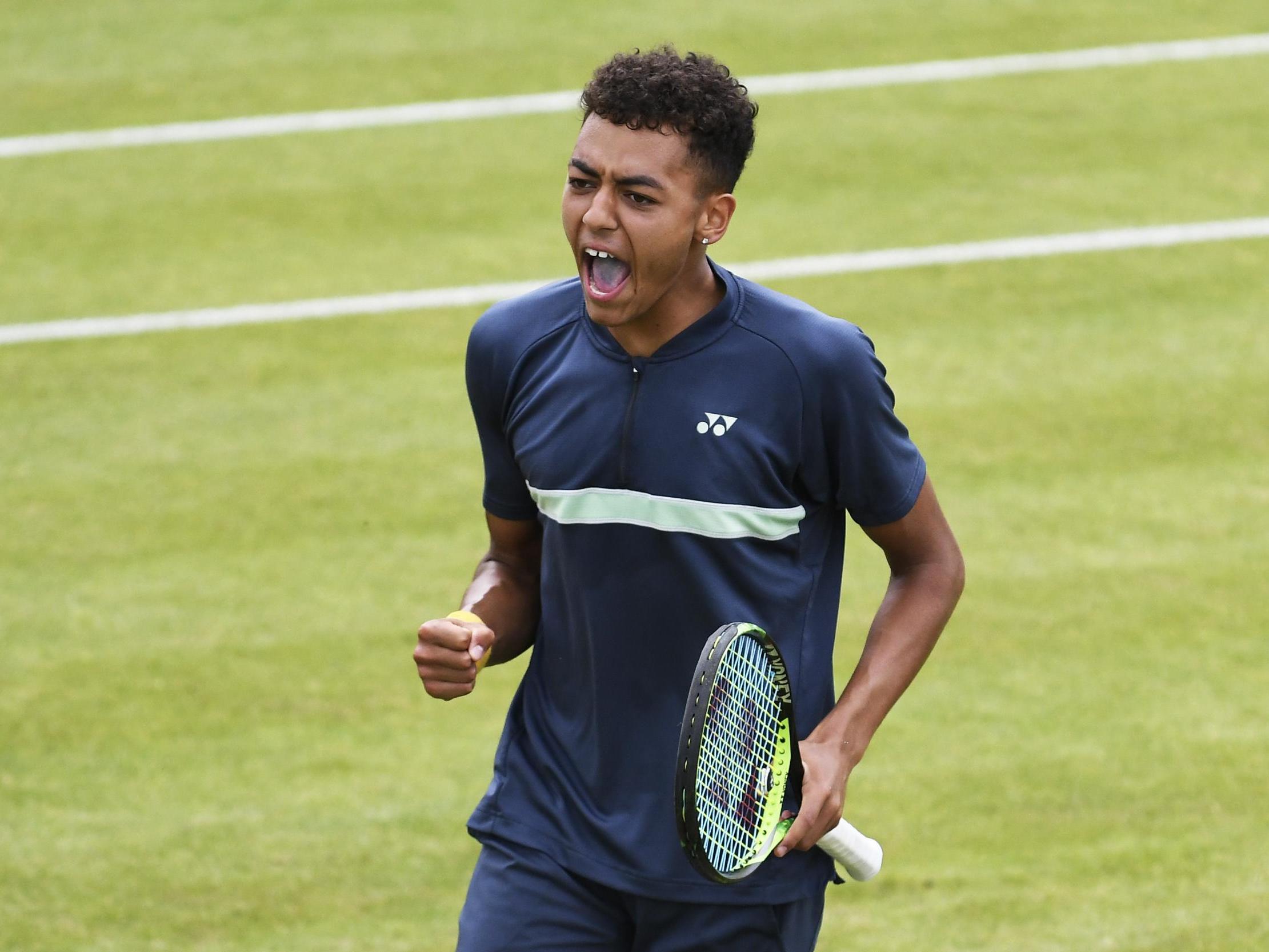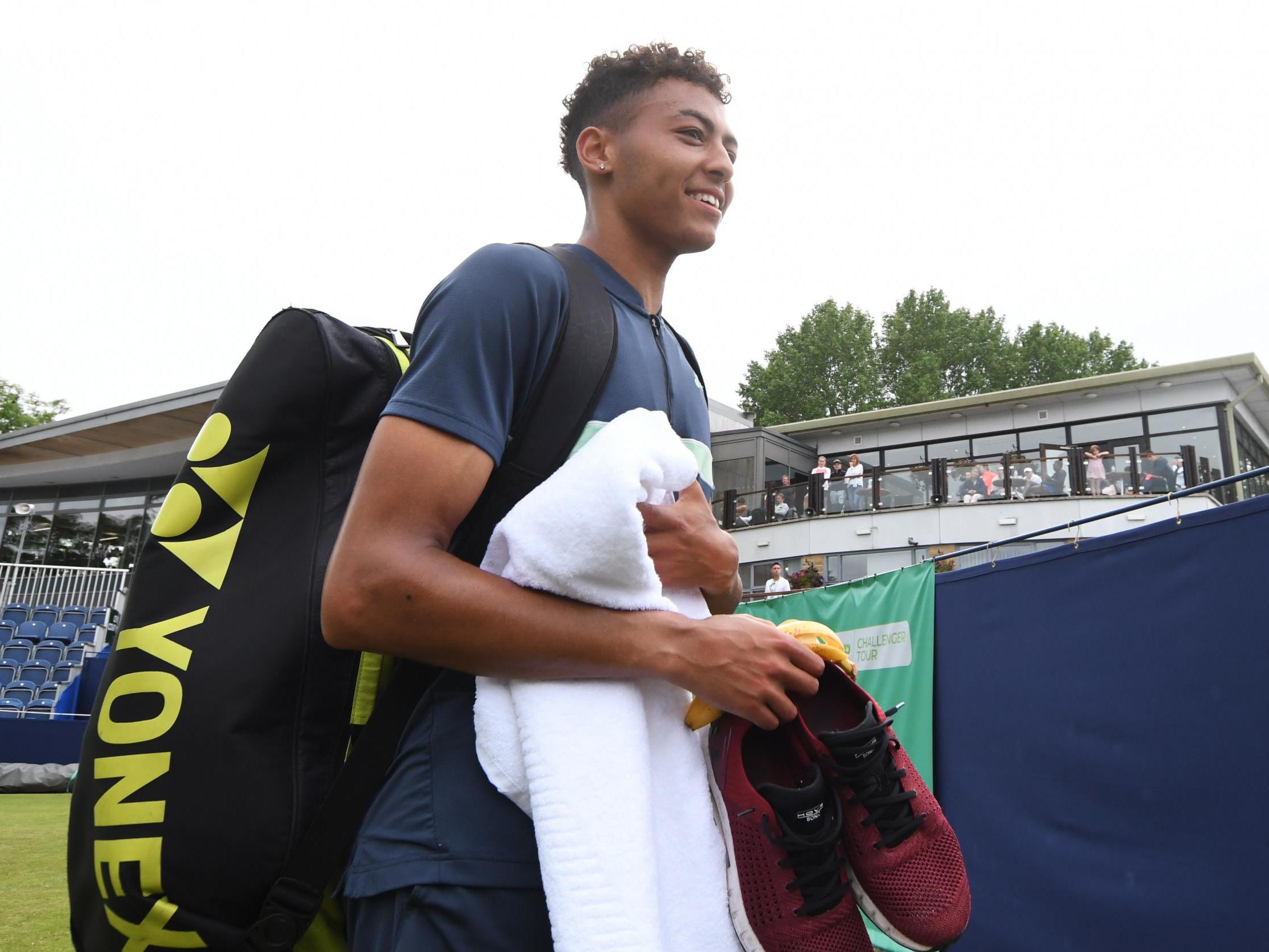Wimbledon 2019: Against a backdrop of tragedy, Paul Jubb shines as Britain’s rising star
Interview: If you wanted proof that anybody can rise to the top in tennis, whatever their background and whatever difficulties they have had to overcome, the 19-year-old provides it

Your support helps us to tell the story
From reproductive rights to climate change to Big Tech, The Independent is on the ground when the story is developing. Whether it's investigating the financials of Elon Musk's pro-Trump PAC or producing our latest documentary, 'The A Word', which shines a light on the American women fighting for reproductive rights, we know how important it is to parse out the facts from the messaging.
At such a critical moment in US history, we need reporters on the ground. Your donation allows us to keep sending journalists to speak to both sides of the story.
The Independent is trusted by Americans across the entire political spectrum. And unlike many other quality news outlets, we choose not to lock Americans out of our reporting and analysis with paywalls. We believe quality journalism should be available to everyone, paid for by those who can afford it.
Your support makes all the difference.This is the time of the year when critics of British tennis regularly complain about the country’s “pampered” youngsters, but even if Paul Jubb loses on his Wimbledon debut next week nobody will be levelling such accusations against the talented 19-year-old from Hull. If you wanted proof that anybody can rise to the top in tennis, whatever their background and whatever difficulties they have had to overcome, Jubb provides it.
Jubb, who has been given a wild card by the All England Club, took a break from practice at Wimbledon on Thursday to talk about his remarkable story. He was brought up on a council estate in Hull by his grandmother, Valerie, from the age of four. His father, Shaun, who was a serving soldier, died by suicide when he was just one year old, while his mother, Jacinta, died seven years later. Jubb has a tattoo on his torso bearing the names of his parents.
From the age of five, nevertheless, Jubb thrived on the tennis court, to the point where he was offered a tennis scholarship by the University of South Carolina. He has been there since he was 16, studying retail management and going from strength to strength with his tennis.
This year Jubb became the first British player to win the National Collegiate Athletic Association men’s singles title, which is the pinnacle of university tennis in the United States, and he has continued to prosper during the current British grass-court season.
Having begun the summer without a world ranking, Jubb has risen to No 472 after winning five matches in his four tournaments. His victims have included Denis Istomin and Andrey Rublev, ranked No 78 and No 109 in the world respectively.
Jubb is understandably reluctant to talk about his parents, but is prepared for plenty of questions about his family background in the coming days. “My parents are not with me any more,” he said. “I think that is basically where I draw my line. That’s all that needs to be said.”
He prefers instead to express his gratitude to those who have helped him through some difficult years, especially his grandmother. “She’s been a huge influence,” Jubb said. “She’s put so much work into raising me, acting like a mother, father, anyone. She’s just been a huge rock in my life.”
Jubb said his grandmother had always stressed the need to behave properly on court. “She used to always say she’d bring me off the court if I started throwing my racket and things like that,” he said. “She always made sure I was behaving on the court. She made sure I was doing the right things.”
How did he think she would feel when he walks out on court for his first match at Wimbledon? “I imagine she’ll be very proud,” he said. “I’m just happy she can see me playing at Wimbledon. “
Jubb thinks his background has helped to make him mentally strong. “You have got to be tough and for sure I definitely look at it as something I can use to my advantage,” he said. “I always believe it has made me a stronger person. For sure I think of it as an advantage, a positive.”
Jonny Carmichael, who coached Jubb from the age of five, is still a major figure in his life, while Josh Goffi, his coach at university, and James Trotman, a Lawn Tennis Association coach, have become increasingly influential figures.
“A big thing for me is just making the people who have helped me along the way proud,” Jubb said. “The ones closest to me know who they are. I think a lot of the reasons why I push myself so hard is obviously for myself and my self-drive, but a huge part of it is that I’ve had to have help along the way. A big reason why I try so hard and work so hard is for those people who have invested time into me.”
Jubb said that Carmichael had helped him to avoid sinking into a “Why me?” frame of mind. “I did have a little stage when I was younger when I felt a bit of self-pity,” he admitted. “He always was like: ‘This is your situation and you can’t change it, so if you’re going to moan about it you’re not going to get anywhere. You’ve got to make the most of what you’ve got.’

“From that point on that’s always been the mentality I’ve had. It is what it is and you’ve just got to work hard. That’s the mentality I’ve had and that’s why I’ve said I’m so lucky to have had the people I have had around me. They’ve not allowed me to look at it that way. They just said: ‘You’ve got to get on with it.’ That’s been what it is. That’s the truth.”
Jubb said that when he was 14 or 15 the American player Frances Tiafoe, currently No 39 in the world rankings, had been a particular inspiration. Tiafoe’s parents emigrated to the United States from Sierra Leone and had little money.
“Obviously Frances’ background was pretty tough,” Jubb said. “I remember having a cheesy conversation with Jonny Carmichael. I messaged him, saying that if this guy could do it [then so could I]. Frances gave me a lot of belief to think that I could do it as well. From that point on I was fully invested in doing whatever I could to progress and hopefully make it on the pro tour one day.”
He added: “You could see how much Frances loved the game and how hungry he was to make that jump into the pro tour. It was the same hunger that I have now.”
Jubb has subsequently got to know 21-year-old Tiafoe and practised with him. Would he like to be a role model like the American? “Obviously it would be nice to give people that belief that if you do have a tough background it shouldn’t be used as an excuse in any way,” Jubb said.

“At the end of the day it’s down to you. It’s possible. He had the right people around him who helped him out and I’ve luckily had the right people around me who helped me out. At the end of the day if you’re willing to put in the hard work anything is possible.”
For the moment Jubb plans to go back to college at the end of this year to complete his studies. As a college player he can use his prize money only to meet his tennis expenses. Even first-round losers at Wimbledon earn £45,000, so Jubb is unlikely to be able to take advantage of whatever prize money will be on offer to him over the next fortnight.
What would change his plans with regard to going back to college? “If I won Wimbledon maybe!” Jubb said with a smile. “I’m still young. I don’t feel a rush right now to go on to the pro tour.”
Did he have any opinion on whose name he would like to be paired with in Friday’s draw? “Whoever it is, I will try to compete my hardest,” Jubb said. “Obviously I would like someone who I have more chance of winning against. No matter who it is, it’s going to be a tough match. I’m just going to compete really hard, like I always do, and enjoy the experience.”
Join our commenting forum
Join thought-provoking conversations, follow other Independent readers and see their replies
Comments